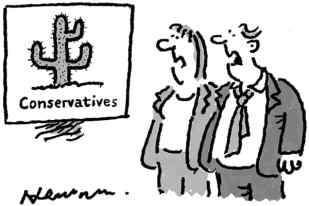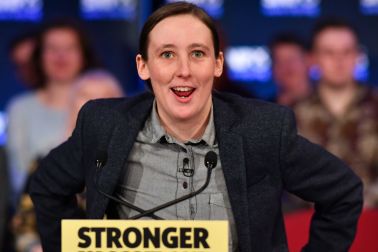In those moments when I most fear that the West is on the skids, I find it helps to make a list of end-time signs, phenomena that indicate decay, like sparks along a piece of faulty wiring. So far my list goes like this: NFTs; babyccinos; liver-flavoured ice-cream for dogs; the fashion for encouraging children to cut off their genitals; the fact that Rowan Williams, former Archbishop of Canterbury, thinks it deeply wrong to talk them out of it; freak shakes; Heinz ‘pink’ sauce; gannets dead all down the North Sea coast; swearing six-year-olds still in nappies (says my teacher friend in the North-East); risking nuclear war over Ukraine; the TV show Is It Cake?
My latest and favourite end times sign is buried in the minutes of a recent meeting of the London Ambulance Service NHS Trust board, in a section about the plight of call handlers. Both 999 and 111 are, as you might expect, in a desperate state. Staff are over-stretched, stressed and resigning at a frightening rate. The response, I read, is to send them on a ‘kindness workshop’, run by a private firm called A Kind Life. Frontline staff have themselves expressed concern that if they’re away for training days, it will inevitably endanger people’s lives, the minutes say. The minutes do not record that senior management are terribly worried. So patients may be dying because staff are attending kindness lessons. Isn’t that somehow so very 21st century?
For a start there’s the increasingly popular idea that almost any problem, however entrenched, can be solved by a workshop or training course. This is part of the general global takeover of HR. Training courses are their stock in trade. Then there’s the eccentric notion that the sort of training poor NHS workers need is not medical know-how, but behaviour training. Be a better person, be less prejudiced, and all will be well. Be less racist and you’ll miraculously be able to insert a cannula or diagnose a child with sepsis.
I know it sounds mean to be down on something as innocuous sounding as a kindness workshop, but this isn’t just a one-off idea. A Kind Life is employed by NHS trusts around the country. Its founder and guru, a man called Tim Keogh, talks proudly of ‘years of work with 35,000 NHS staff’. And you have to remember that kindness in this context isn’t an act so much as a set of beliefs.

Take this example from an American East Coast company offering kindness training to university staff: ‘How do we identify and overcome some of the most abrasive forms of incivility within our various communities and work towards building an ethic of care?
‘Through this workshop, we will not only identify how lateral violence manifests and is maintained by a colonial mindset, but more importantly we will explore ways to liberate ourselves from this cycle of oppression and build a more healing workplace.’
Did you think that to be kind meant to go out of your way to help someone? I’m afraid, in workshop world, that’s a very passé definition. The golden rule of the new corporate kindness is always to be kind to yourself first. Any impulse towards self-sacrifice is a grave error of moral judgment. Tim Keogh agrees. ‘Be kind to yourself, that’s the first step,’ he tells clients, and I see this makes sense from a business point of view. Rebranding kindness as wellbeing is an easy sell, and customer feedback means repeat business.
There’s the idea that almost any problem, however entrenched, can be solved by a workshop
I feel bad singling out Tim Keogh. I’m sure he’s nice enough. He looks very C of E: evangelical smile, just a touch of hangdog. Tim looks like the sort of man who sometimes thinks about getting a tattoo of Charlie Mackesy’s boy and horse but doesn’t quite dare. And I’ve never attended A Kind Life workshop, so what do I know? But then… the sheer horror of its website.
‘We co-create values and behaviours,’ explains A Kind Life online. ‘What people want to see when you are at our best. The behaviours that don’t work for people. Using their words and experiences. Making it easier to notice, role model, speak up and appreciate.’
Is that ‘role model’ as a verb? What’s wrong with full sentences? Are they somehow unkind?
And what in the name of all that’s holy does it mean for people to ‘want to see when you are at our best’? I suppose it’s a typo. I hope it’s a typo. This sort of drivel fills page after page. I don’t think it’s just packaging. I think this is the actual substance of the ‘kindness’ course. It’s what they offer.
Since the 1980s it’s been compulsory for anyone in any form of consultancy to have their own set of acronyms. A Kind Life has BUILD: ‘Behaviour, (understand), Impact, Listen, Do Differently.’ You can judge a company by the quality of its acronyms. On the upside, I suppose, if you were a frontline medical worker sent to stare at this insane gubbins on PowerPoint for a day, catheterising patients would seem like a relief.
A Kind Life seems to be a spin-off of a company called April Strategy, founded by another Tim – Tim W. This Tim calls himself a senior adviser to leading global organisations on growth strategy: ‘Tim began his career in international brand management and marketing with Unilever followed by ten years in a strategic marketing consultancy.’ It’s a pretty good rule of thumb that if you follow the money back to its source, almost every company offering kindness training or trying to raise corporate awareness is, in the end, making a profit for some Tim from Unilever. Look for the word ‘boutique’ as a giveaway.
Who can blame the Tims? Selling kindness is big business these days, a real growth industry across the West, and particularly popular in medical settings. It’s just a mystery, another end times sign, as to why anyone thinks that the sort of men and women who choose to train as medics need lectures on kindness by people with a background in marketing consultancy.







Comments